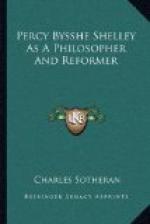“The first man yielded to this temptation; and to satisfy Divine Justice the whole of his posterity must have been eternally burned in hell, if God had not sent his only Son on earth, to save those few whose salvation had been foreseen and determined before the creation of the world.”
The hero of this fabulous episode, beneath which a great truth lies hidden, the Christian Ahrimanes or Typhon, the Devil, as painted by Milton, he considered a moral being, far superior to the God depicted by the same author, and who, under the form of the second person of the Christian Trinity, Shelley tells us of coming humbly,
“Veiling his horrible
God-head in the shape
Of man, scorn’d by the
world, his name unheard,
Save by the rabble of his
native town,
Even as a parish demagogue.
He led
The crowd; he taught them
justice, truth, and peace,
In semblance; but he lit within
their souls
The quenchless flame of zeal,
and blest the sword
He brought on earth to satiate
with the blood
Of truth and freedom his malignant
soul.”
Elsewhere, in extension of the same, he puts the accompanying words in the mouth of God the Father, to illustrate the doctrine of Christian Atonement:
“I will beget a son,
and he shall bear
The sins of all the world;
he shall arise
In an unnoticed corner of
the earth,
And he shall die upon a cross,
and purge
The universal crime; so that
the few
On whom my grace descends,
those who are marked
As vessels to the honor of
their God,
May credit this strange sacrifice,
and save
Their souls alive. Millions
shall live and die,
Who ne’er shall call
upon their Saviour’s name,
But unredeem’d go to
the gaping grave;
Thousands shall deem it an
old woman’s tale,
Such as the nurses frighten
babes withal;
These, in a gulf of anguish
an I of flame,
Shall curse their reprobation
endlessly,
Yet tenfold pangs shall force
them to avow,
Even on their beds of torment,
where they howl,
My honor and the justice of
their doom.
What then avail their virtuous
deeds, their thoughts
Of purity, with radiant genius
bright,
Or lit with human reason’s
earthly ray?
Many are call’d but
few will I elect.”
The popular faith of Europe and America, which experience demonstrates to this age has, even as a means of reforming humanity, been a complete failure, Shelley correctly believed, had the same human foundation and origin as that of other revealed theologies—he sums up the proofs on which Christianity rests, miracles, prophecies, and martyrdoms, with great clearness; proves the absurdity of the doctrine of miracles, as taught by Christian writers, shows the falseness




